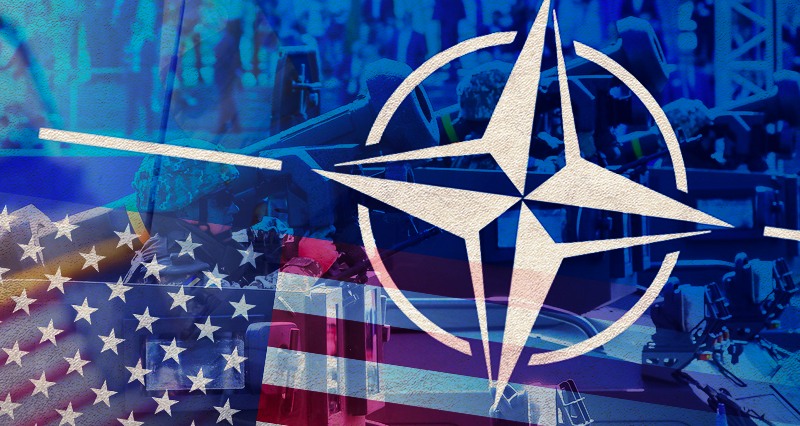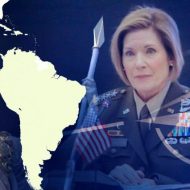As the struggle over Ukraine between Russia and the United States continues, we turn our attention to some of the most relevant historical factors influencing the current crisis.
An extraordinary exigency: crisis in Ukraine
It is impossible to explain what is happening in the world solely through the lens of military strategy, sociology or political science. A new multipolar world order is being formed outside of the frames of classical theories and practices of political history. For the first time in the history of politics, we see a superpower (the USA) actively encouraging another superpower (Russia) to invade a minor country (Ukraine), and taking enormous effort pushing a psychological campaign of propaganda in favor of a war.
Statements from US President Joe Biden, such as that “It’s one thing if it’s a minor incursion and we end up having to fight about what to do and not do”, are quite rare in the history of politics. On the other hand, the Ukrainian President’s rebukes over the US State Department’s order for the families of the diplomats in Kiev to leave the country, and the declaration that “Such actions demoralize the Ukrainian people”, or his complaining at a press conference on January 28 2022, that “There will not be a war and this kind of rhetoric causes nationwide panic, we have already lost 2.5 billion USD in the financial sector last month” were likewise interesting. The Americans and the British are almost begging Russia to launch a military intervention.
Ukraine, however, is trying its very best to avoid war. The American broadcaster CNN and the British BBC claim that Russia will eventually invade Ukraine and that Ukrainian troops and armed civilians will resist, much like the Mujahideen in Afghanistan. Interestingly, General Wesley Clark, a former NATO Supreme Allied Commander of Europe (SACEUR), threatened the Russians on a live morning TV show on January 27, 2022, saying that “They will suffer the consequences of an invasion, will turn into a pariah state, that thousands of Russian citizens will die, and that Putin will end up to be a war criminal like Milosevic.” (As if the invaders in Vietnam, Laos, Cambodia, Nicaragua, Grenada, Afghanistan, Iraq, Libya and Syria came from another planet!)
We are watching a ludicrous spectacle
Despite all the provocations and promises of support for Ukraine, the United States is sending a ludicrous 8,500 NATO reinforcements to Europe. The Secretary General of NATO is also playing his part quite well in this war ensemble. He is hoping to turn this crisis into an opportunity to support the purpose of NATO’s existence, trying to form a bond with Ukraine despite it not being a NATO member, spreading the idea of a common threat for alliance members, and trying to cover up the horrible failure in Afghanistan. The American Secretary of Defense is saying that “The focus in Eastern Europe is to provide safety for the NATO members, rather than the war in Ukraine itself”. However, just like in the European Union, NATO also lacks any unity of action against Russia and a solid stance against this crisis. The President of Croatia, a NATO and EU member, has issued statements directly contradicting those of Washington; Germany refused to open its airspace for the allied transport planes carrying supplies to Ukraine and delivered a limited support, in form of 5,000 combat helmets to Ukraine. The French President stressed Europe’s defense of its own identity in the midst of the crisis, and there are many other examples showing the tragicomic decline of Europe’s Trans-Atlantic relationship with the United States after the establishment of the world order they constructed 77 years ago. The United States and NATO need a war between Ukraine and Russia, but Russia says it is not going to play that game. And the Ukrainian president’s statements are unprecedented. The world has seen some absurd things: the Great Guano War of 1879 in which Peru, Bolivia and Chile fought over bird excrement, or the Football War between El Salvador and Honduras in 1969 that resulted from fights that broke out after a match, but this is a new level of absurdity.
A war, just in time
Perhaps the greatest amusement is what is happening in the UK. The house party that Prime Minister Boris Johnson (a descendant of the post-WWI pro-British Mandate journalist Ali Kemal) threw despite the very strict Covid lockdowns in the country just one night before the funeral of Prince Philip, Duke of Edinburgh, has led to some serious backlash, and the police have launched an investigation. We have seen a significant decline in the approval rating for Johnson and his party, and a vote of no confidence has been suggested. Interestingly, in an environment where a virus can topple a government, Prime Minister Johnson decided to provocatively add the Ukraine crisis to his nation’s list of worries in a speech he gave at the House of Commons. The Prime Minister, who is hoping for a Russian invasion of Ukraine as much as the United States is, gave a speech pushing his radical political remedy.
The collapsing reputation of the United States
American president Abraham Lincoln, who lived through and also managed to unite the US after the American Civil War, once said, “The best way to predict your future is to create it.” Lincoln put the country itself at risk with a civil war caused in part by opposition to slavery, and it was by no means certain that he would eventually win. However, he paid for his success when he was assassinated.
Securing its national unity, the United States continued to shape the future according to its own geopolitical and economic interests via direct or indirect strategies, just as any empire has.
This strategy was applicable until the 21st century, where things have become far more complex. Yet, they are still trying the same methods and are failing.
All the plots and provocations they planned in Eurasia have failed. Examples such as the South Ossetia and Georgia in 2008, the Ukrainian Euromaidan provocations ending up in Russia’s favor in 2014, the failure of the July 15th 2016 FETO coup attempt in Turkey, Pashinyan coming to power in Armenia in 2018 and taking an anti-Russian stance setting up Azerbaijan to liberate Nagorno-Karabakh in November 2020, the CSTO taking back control after the provocation in Kazakhstan on January 2022, etc. All of these incidents have proven that despite the US’ alleged hegemony, it cannot take any meaningful initiative in Eurasia. The colored revolution model had succeeded in many countries before 2008. Now, we are witnessing the futile efforts of a collapsing structure in Ukraine with all its proxies and vassals, the first among them being the UK.
How did Washington reach that position?
The United States became the most powerful country in human history, both economically and militarily, after its victory in World War II, in 1945– 28% of its national income was based on industrial production (while it is around 11% today). Most importantly, they had played the role of heroes who saved Europe from Hitler and Mussolini, and saved Asia from Hirohito and the fascist Japanese military regime– even though committing one of the worst war crimes in history by using two nuclear bombs on cities in Japan. The price of this role was not cheap: tens of thousands of Americans died on foreign soil. Hundreds of warships and planes were either sunk or shot down. As a result, there was global sympathy and support for the US. No one questioned their previous records, their crimes against the African people and the Native Americans, or what they did in the Caribbean and Central America after the Monroe Doctrine was proclaimed in 1823. Moral superiority was in the hands of the stereotypical white, Protestant and Anglo-Saxon Americans. Much of the world, including Turkey, wanted to become the ‘little America’. Standing against this American dream, however, was the Communist USSR.
Geopolitics above ideology
Despite the two countries being founded on such different ideologies, the United States allied with the USSR in World War II. However, after the war ended, the geopolitical conditions brought these two victors of the European Theater against each other. The Cold War was inevitable. The Soviet Union managed to unite 15 federal republics under a Marxist ideology in 1922 and had taken its place in world politics long before the start of World War II.
However, it was not yet at the level of a global power. The United States and Great Britain saw the Soviets as a major threat that needed to be contained, given that they had built a massive arms industry after losing 20 million people in the war, also saving Europe from Hitler by entering Berlin. More importantly, however, they developed their first nuclear weapon in 1949. The Cold War began in 1949, when the term ‘iron curtain’ was first used by Winston Churchill in the United States, the same year that NATO was established. The United States was aware that the enormous military-industrial complex it created during World War II had earned the country a superpower status, and that it needed wars and production of arms to sustain the capitalist-liberal state. Its future was based on the policy Divide and Rule (Divide et Impera). The Soviets were contained by George Kennan’s famous Containment Strategy, with a strip of rimlands all the way from Canada to China. Russia had to be prevented from having access to the oceans from the west and the south, as it was a continental power.
Polarization and containment
The American century forced the Soviet Union into collapse with both ideological polarization and geopolitical containment. The Cold War ended in an American victory when the Berlin Wall fell at the end of 1989, without a possible World War III breaking out, thanks to NATO, bilateral alliances, military interventions, coup plots and the provocation of civil wars. First the Warsaw Pact was disintegrated, then the 15 federated republics of the Soviet Union broke up. Although the Commonwealth of Independent States (CIS) was established in 1991 with only 12 of former Soviet Republics, it was far from a collective foreign and security policy.
The Near Abroad Doctrine
The dissolution of the USSR came so quick that Russia could barely take any measures against the defense and security vacuum created by the withdrawal to the east, a space that was filled by the collectives and countries hostile to Russia. As a result, Russia initiated the Near Abroad Doctrine in 1993, also known by the name ‘Kozyrev Doctrine’. The doctrine focused on getting the former USSR republics to remain in the Russian geopolitical sphere of influence, and to prevent them from becoming members of NATO or the EU. But it was already too late.
Geopolitical devastation for Russia
First, three former Warsaw Pact members (Czech Republic, Hungary and Poland) joined NATO on March 12, 1999, then followed Romania, Bulgaria, Slovakia, Lithuania, Estonia and Latvia on March 29, 2004. The Baltic Republics were completely separated from Russian influence. At the NATO Summit in Bucharest on April 4th 2008, Ukraine’s accession to NATO was officially announced. Georgia was not granted the same status at the same summit but was instead given an ‘aspirant’ (Aspiring for Membership) status. NATO has expanded east in violation of the agreements reached between Gorbachev and Reagan after the ‘opening-up’ period and the collapse of the Berlin Wall.
This was also in violation of Article 8 of the final report of the OSCE Summit in Istanbul in 1999: “Each participating State has an equal right to security. We reaffirm the inherent right of each and every participating State to be free to choose or change its security arrangements, including treaties of alliance, as they evolve. Each State also has the right to neutrality. Each participating State will respect the rights of all others in these regards. They will not strengthen their security at the expense of the security of other States. Within the OSCE no State, group of States or organization can have any pre-eminent responsibility for maintaining peace and stability in the OSCE area or can consider any part of the OSCE area as its sphere of influence.”
Access to sea is crucial
The five former Soviet republics (Estonia, Latvia, Lithuania, Ukraine and Georgia) that had access to the sea were vital for Russia in the fields of economy and defense, as these countries offered access to large bodies of water. The Russian loss of the Baltic Republics was sheer geopolitical devastation. Even George Kennan, the mastermind behind the American Rimland Containment Doctrine, said in May 1999 that the expansion of NATO was one of the most fateful errors of American policy and would damage the efforts to transform Russia from an enemy to a partner, beyond repair: he was right. Russia was well-aware of the strategic risks and threats that a large military buildup at sea would pose on land in the future, especially after it lost the grip on most of the Baltic Sea. On the other hand, the Kaliningrad Oblast in Russian Baltic coast had now lost its land connection to the Russian mainland. St. Petersburg in the north, is covered in ice throughout the winter.
On the other hand, the possibility of Ukraine and Georgia joining NATO after Romania and Bulgaria, basically meant death for Russia in the Black Sea. Being besieged by the sea in the Baltic, Russia would be fully encircled in the Black Sea and would hand over all former Soviet Republics around the Black Sea coast to NATO. This was the ultimate geopolitical vision for the US and Atlantic hegemony at the Black Sea, over which 60% of Russian foreign trade is transported. And this vision still has not changed.
The Black Sea is now the primary target
It is impossible to understand the Ukrainian crisis and the warmongering of the US today, without fully grasping this geopolitical reality. Just like Russia, Turkey is also being forced to stay on land and being locked into the continent by the heavily-maritimized Atlantic Bloc. Although Turkey is technically a member of NATO, the US hegemony has besieged Turkey in the southeast with the PKK/YPG/PYD terrorist groups, and with Southern Cyprus and Greece in the south and in the west, which make up most of our access points to the seas. The imposition of the Seville Map and the hostilities against the Blue Homeland Doctrine are the results of that grand strategy.
Some advice for Turkish Atlanticists
Those in Turkey who consider it a privilege to live under a foreign mandate and become vassalized can go ahead and continue to see the Russian-Ukrainian crisis as a conflict between the ‘powerful Russian oppressors’ and the ‘weak and oppressed Ukrainians’. If the Ukrainian crisis keeps growing and turns into a full-fledged war, Turkey will be the country that will suffer the most. It will be subject to diplomatic pressure from the implementation and interpretation of the Montreux Convention biased against Russia, to the acceptance of NATO warships passing into the Black Sea. We were lucky to remain neutral in World War II, but today, as a NATO member state, we have no such luck. A besieged Russia means a besieged Turkey. I can only hope those who got the allegory of a coup from the press release of some 104 Admirals about the Montreux Convention can now understand what is going on today.









Leave a Reply